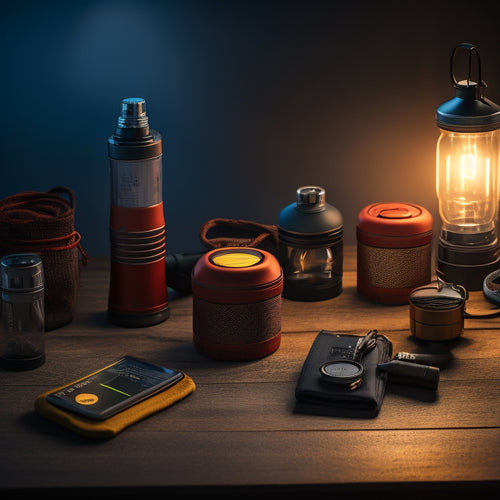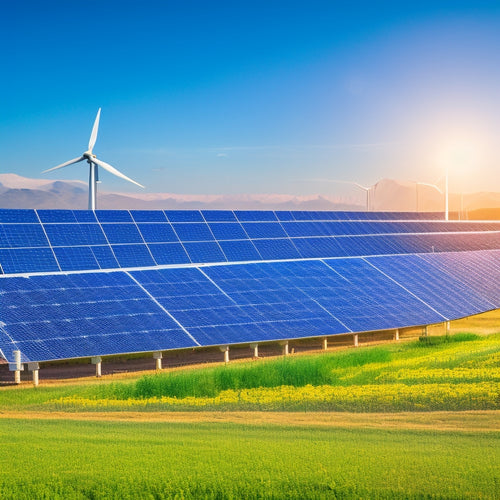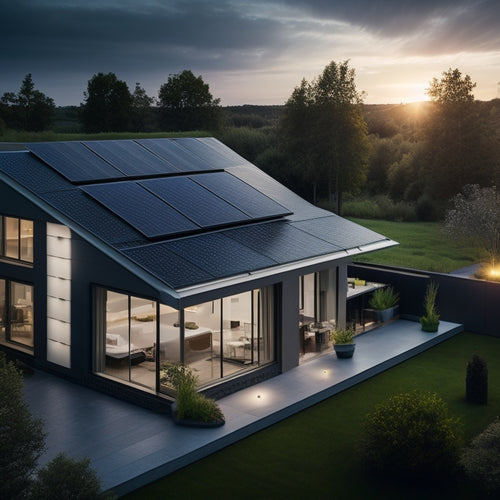
Easy Solar Power System
Share
You're taking the first step towards utilizing the power of solar energy, and with an easy solar power system, you can greatly reduce your energy bills while contributing to a cleaner, sustainable future. By installing solar panels, you'll not only save money on energy costs but also increase your property value. To maximize energy collection, it's vital to optimize panel placement and energy storage solutions. Evaluating your energy demands is essential to designing an effective system. With advanced technology in solar panels, you can achieve higher efficiencies. Now, take the next step to tailor an easy solar power system that suits your specific needs and investigate the benefits that await you.
The Essentials
- Switching to solar power reduces energy expenses, potentially leading to zero energy bills, and government incentives offset installation costs.
- Conducting energy audits identifies efficiency improvements in homes, and utility companies provide rebates for transitioning to solar power.
- Solar power systems increase property value, with the National Renewable Energy Laboratory indicating a boost of up to $15,000.
- Proper panel placement is crucial for maximizing energy collection, and energy storage solutions ensure power supply during low sunlight periods.
- Assessing daily energy consumption in watt-hours helps design an effective solar system that meets specific energy needs.
Zero Energy Bills
You're about to uncover how an easy solar power system can greatly reduce your energy expenses, saving you money every month.
By utilizing renewable energy from the sun, you'll be generating free electricity and offsetting your reliance on the grid.
With Solar Power for House solutions, you can eliminate the worry of rising electricity bills, and by doing so, you'll be contributing to a cleaner, more sustainable future.
This means you'll be enjoying lower utility bills, or even eliminating them altogether, and keeping more of your hard-earned cash in your pocket.
Reducing Energy Expenses
Your energy expenses are likely one of the largest monthly bills you pay, and it's no secret that these costs can be a considerable burden on your budget. By switching to a solar power system, you can meaningfully reduce your energy expenses and enjoy zero energy bills.
To get started, consider taking advantage of solar incentives and tax credits offered by the government to offset installation costs. Conducting an energy audit will help you identify areas in your home where energy efficiency can be improved, making your solar power system even more effective.
Additionally, integrating a battery storage system can help you store excess energy generated during the day to use at night or during power outages, giving you even more control over your energy bills. Many utility companies offer rebates for homeowners who switch to solar power.
When choosing a solar power system, consider financing options that work best for your budget. Proper maintenance is key to ensuring your system operates efficiently; follow maintenance tips to extend the lifespan of your system.
With a grid connection, you can sell excess energy back to the grid and reap the environmental benefits of switching to renewable energy. Finally, stay up-to-date on government regulations and policies that support the adoption of solar power.
Saving Money Monthly
As a result of installing a solar power system, one of the most significant benefits you'll experience is a drastic reduction in your monthly energy bills, potentially even eliminating them altogether.
This reduction in energy expenses translates to significant utility savings, which can be substantial over time. By utilizing solar power potential, you can maximize your energy efficiency and reduce your carbon footprint.
With solar power, you'll generate your own clean energy, reducing your reliance on the grid and lowering your energy bills.
You'll also benefit from solar incentives, such as net metering, which allows you to sell excess energy back to the grid and offset your energy consumption during periods of low sunlight.
Additionally, many governments offer tax credits and rebates for homeowners who invest in solar power systems, further increasing your savings.
Increases Property Value Fast
You'll find that installing an easy solar power system considerably enhances your home equity, which translates to a higher selling price if you decide to put your property on the market.
Not only does it increase your property value, but it also reduces your energy bills and carbon footprint, making it a highly desirable feature for environmentally conscious buyers renewable energy solutions.
This increase in property value is immediate, and it's a major perk for homeowners who plan to sell their property in the near future.
Boosts Home Equity
Installing a solar power system considerably increases property value, thereby enhancing home equity. As a homeowner, you can reap the benefits of a solar power system, which not only reduces your carbon footprint but also provides a significant return on investment. This home improvement can increase your property value, giving you a sense of financial freedom and security.
| Location | Average Increase in Property Value | Average Investment Return |
|---|---|---|
| California | 3.6% | 115% |
| New York | 2.4% | 95% |
| Florida | 2.1% | 85% |
| National Average | 2.2% | 90% |
Raises Selling Price
Your solar power system becomes a major selling point when you decide to put your property on the market. According to current solar market trends, a solar-powered home can increase its selling price by up to 17%. This is because buyers are willing to pay a premium for the benefits that come with solar energy, such as lower electricity bills and a reduced carbon footprint.
When you install a solar power system, you're not only saving money on energy costs, but you're also increasing the value of your property. This is reflected in the property appraisal, which takes into account the system's cost and the benefits it provides. As a result, your property becomes more attractive to potential buyers, giving you an edge in a competitive market.
With a solar power system, you can expect to recoup your investment and then some. In fact, the National Renewable Energy Laboratory found that solar panels can increase a home's value by up to $15,000.
This means you can sell your property faster and for a higher price, giving you the freedom to move on to your next journey.
Maximizes Energy Harvesting Potential
You'll want to guarantee your solar power system maximizes energy harvesting potential by enhancing panel placement to capture the most sunlight possible.
This involves strategically positioning panels to minimize shading, angle them for ideal energy absorption, and orient them to match your region's solar path.
By incorporating a reliable off-grid battery solutions and a deep cycle battery, you can secure a steady power supply even during periods of low sunlight.
Additionally, you'll need to take into account energy storage solutions to store excess energy generated during the day for use during periods of low sunlight or at night.
Optimal Panel Placement
Across the rooftop, a crucial factor awaits: ideal panel placement. You're about to access the full potential of your solar power system, and it all starts with enhancing panel placement.
To maximize energy collection, you'll need to evaluate solar orientation. Ideally, your panels should face directly at the sun, which means a south-facing orientation is best. However, if that's not possible, don't worry – a west- or east-facing orientation can still yield impressive results.
Next, conduct a shading analysis to identify any obstacles that might be blocking sunlight. Take note of nearby trees, buildings, or other structures that could cast shadows on your panels.
By understanding the shading patterns, you can strategically place your panels to minimize energy loss. Consider using a solar pathfinder tool to visualize the sun's path and identify the best placement for your panels.
With optimal panel placement, you'll be utilizing the power of the sun like a pro, and enjoying the freedom that comes with generating your own clean energy.
Energy Storage Solutions
The solar power system's energy storage solution is a critical component that maximizes energy harvesting potential.
You'll want to select a battery technology that integrates seamlessly with your solar inverters, guaranteeing a reliable and efficient flow of energy. As you investigate renewable resources, consider grid integration options that allow you to store excess energy for later use or feed it back into the grid.
When evaluating energy storage solutions, prioritize sustainable solutions that align with your values of freedom and independence.
Look for systems that offer advanced energy management capabilities, allowing you to monitor and control your energy usage in real-time. Additionally, consider the installation techniques and system maintenance requirements to confirm your energy storage solution operates at peak performance.
Lastly, verify your energy storage solution meets rigorous safety standards, providing you with peace of mind and protection from potential risks.
Assess Your Energy Demands
You'll need to determine your daily energy consumption to size your solar power system correctly. This involves calculating your total daily energy usage in watt-hours (Wh) by adding up the power consumption of all your appliances and devices.
With the rise of renewable energy solutions, it's crucial to evaluate energy storage systems home battery systems to guarantee a reliable power supply during outages.
You should also identify your energy usage patterns, such as when you use the most energy during the day, to optimize your system's performance.
Daily Energy Consumption
Energy efficiency begins with understanding your daily energy consumption, a crucial step in designing an effective solar power system. You need to assess your energy demands to determine how much power you require to support your daily habits.
Start by identifying the appliances and devices you use regularly, such as lights, refrigerators, computers, and televisions. Calculate the wattage of each device and the number of hours you use them daily. This will give you an idea of your total daily energy consumption.
Track your energy usage for a week or a month to get an accurate depiction. You can use an energy monitoring device or consult your past electricity bills to get an estimate.
Be honest about your energy usage habits, as this will affect the size and efficiency of your solar power system. By understanding your daily energy consumption, you can design a system that meets your specific needs, providing you with the freedom and independence you desire.
Energy Usage Patterns
As your daily energy consumption calculation reveals the total wattage required, it's essential to examine your energy usage patterns to identify areas of optimization. This assessment will help you understand when and how you use energy, enabling you to make informed decisions about your solar power system.
You'll want to identify your energy-intensive appliances, such as refrigerators, air conditioners, and electric water heaters, and determine when they're used most frequently. This information will help you design a solar power system that meets your energy demands during peak usage periods.
Current solar trends emphasize energy efficiency, and understanding your usage patterns is fundamental to achieving this goal. By analyzing your energy usage, you can identify opportunities to reduce your energy consumption, such as replacing incandescent bulbs with LEDs or upgrading to energy-efficient appliances.
This, in turn, will allow you to optimize your solar power system's performance, reducing your reliance on the grid and increasing your energy independence.
Higher Efficiency Solar Panels
You'll want to contemplate solar panels with advanced cell technology to enhance your system's overall efficiency.
These high-performance panels feature innovative designs, such as multi-junction cells or back-contact cells, which enable them to convert more sunlight into electricity.
Advanced Cell Technology
Most modern solar panels boast efficiencies ranging from 15% to 20%, but advanced cells can take this a step further.
You're likely to benefit from solar cell advancements that have pushed photovoltaic efficiency to new heights. Advanced cell technology has led to the development of high-efficiency solar cells with efficiencies exceeding 22%. These cells employ state-of-the-art materials and designs that enable them to convert more sunlight into electricity.
You'll notice that advanced cells often feature multiple layers of photovoltaic material, allowing them to capture a wider range of sunlight. This multi-junction approach can increase energy output by up to 50% compared to traditional single-junction cells.
Additionally, advanced cells may incorporate techniques like concentrated photovoltaics, which use lenses or mirrors to focus sunlight onto the cells, further enhancing efficiency.
Frequently Asked Questions
Can I Install Solar Panels on My Old or Damaged Roof?
You should assess your old or damaged roof's condition before installing solar panels, considering factors like structural integrity, age, and necessary repairs, as a thorough roof assessment informs essential installation considerations, ensuring a safe and efficient setup.
How Long Does It Take to Install a Solar Power System?
As you envision utilizing the sun's energy, you're likely wondering how long it'll take to get started. Typically, installation timelines range from 1-3 days for standard solar panel types, but this can vary depending on your roof's complexity and local permits.
Are Solar Power Systems Resistant to Extreme Weather Conditions?
You'll be relieved to know that solar panels are designed with durability in mind, ensuring they can withstand extreme weather conditions, from scorching heat to torrential rains, and still generate power efficiently.
Can I Use Solar Power to Charge My Electric Vehicle?
You can charge your electric vehicle using solar power through solar charging systems, seamlessly integrating EVs with renewable energy; this setup allows you to utilize clean energy, reducing carbon footprints and relying less on the grid.
Will I Still Have Power During a Grid Outage With Solar?
You'll maintain power during outages with a solar setup, achieving grid independence, as long as you're paired with a reliable backup battery, ensuring your EV stays charged and your home remains lit, free from utility reliance.
Final Thoughts
By now, you've seen how an easy solar power system can alter your energy environment. With zero energy bills, increased property value, and maximized energy harvesting potential, the benefits are undeniable. By evaluating your energy demands and leveraging higher efficiency solar panels, you'll be well on your way to a sustainable future. Visualize your energy independence: a grid-free existence where the sun powers your home, and your wallet thanks you.
Related Posts
-

Best Solar Powered Flashlights for Emergency Situations
When you're choosing the best solar-powered flashlights for emergency situations, focus on their brightness, battery ...
-

The Role of Battery Monitoring Systems in Renewable Energy
Battery monitoring systems play an essential role in renewable energy by enhancing system longevity and optimizing pe...
-

Home Solar Battery
You're opting for a home solar battery that allows you to utilize the power of the sun during the day and use it at n...


